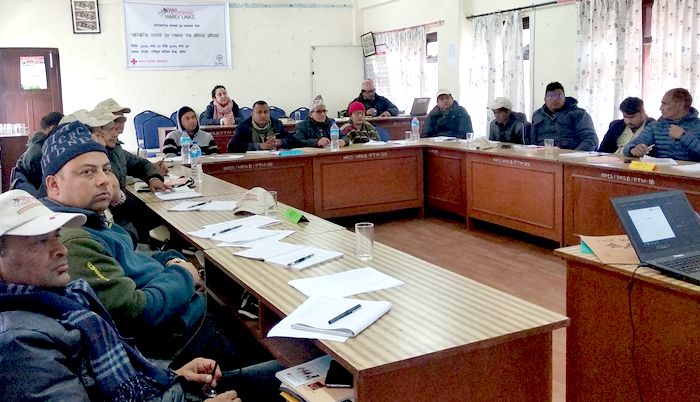The Nepal Red Cross Society (NRCS) in collaboration with the ICRC organised a training of the trainers (ToT) working on Restoring Family Links (RFL) at the Society’s training centre in Kavre from 3-7 February 2020. Twenty-one participants from 18 districts, including NRCS volunteers and staff, participated in the programme.
Bikes Regmi Dang, a public health officer who completed the training, recalled his first brush with the NRCS as a member of its youth circle many years ago. The ToT enabled him to understand the activities carried out by the Red Cross beyond first aid, blood transfusion, disaster preparedness and response. “There are many aspects to the RFL work and it includes tracing those who go missing due to armed conflict, natural disaster etc. I am thrilled imagining how rewarding it would be when you help reconnect and reunite separated family members,” he said.
Sunita Khadga of NRCS Bardiya District Chapter (DC) came with a rich experience of 15 years with the NRCS in different roles and capacities. She plans to share the learnings of the ToT with the junior Red Cross circles and sub-branches of the NRCS in her district.
During the five-day training, the trainers engaged with and reflected on diverse aspects of the RFL activities – from filling the forms for the missing to accounting and reporting. The topics covered method and strategy for the RFL services, RFL services during disaster, RFL for migrant workers and inmates; stress management, dignified management of the dead, code of conduct for the RFL service providers. Participants also worked on relevant case studies and developed RFL training curriculum which would aid them in shaping the trainings they would conduct for the RFL volunteers subsequently.
Shaligram Tiwari, tracing officer and one of the ToT facilitators, said the NRCS has been carrying out RFL activities since 1987, however the programme really took off when the Society collaborated with the ICRC after 1996 – when the decade-long armed conflict in Nepal started. “The RFL file is active in all 77 districts of the country and there are tracing focal persons in each of the districts,” he said. Tiwari has been working on RFL since 2011. At present, 305 volunteers are active in the Society’s RFL activities.
Sandesh Shrestha, head of the ICRC’s protection programme in Kathmandu, said, “The objective of the ToT is to develop a pool of qualified trainers who can serve the RFL needs at the provincial level.” NRCS-trained RFL volunteers annually visit the families of the missing persons to ensure they are not forgotten and the Red Cross continues to facilitate them in their search for their missing loved ones.


